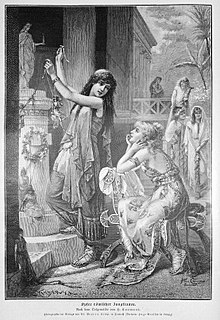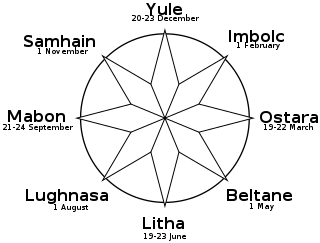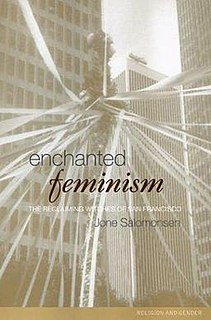Related Research Articles
Animism is the belief that objects, places, and creatures all possess a distinct spiritual essence. Potentially, animism perceives all things—animals, plants, rocks, rivers, weather systems, human handiwork, and perhaps even words—as animated and alive. Animism is used in the anthropology of religion, as a term for the belief system of many Indigenous peoples, especially in contrast to the relatively more recent development of organized religions. Animism focuses on the metaphysical universe, with a specific focus on the concept of the immaterial soul.

Modern paganism, also known as contemporary paganism and neopaganism, is a term for a religion or family of religions influenced by the various historical pre-Christian beliefs of pre-modern peoples in Europe and adjacent areas of North Africa and the Near East. Although they share similarities, contemporary pagan movements are diverse, and do not share a single set of beliefs, practices, or texts. Scholars of religion may characterise these traditions as new religious movements. Some academics who study the phenomenon treat it as a movement that is divided into different religions while others characterize it as a single religion of which different pagan faiths are denominations. Because of these different approaches there is disagreement on when or if the term pagan should be capitalized, though specialists in the field of pagan studies tend towards capitalisation.

Paganism is a term first used in the fourth century by early Christians for people in the Roman Empire who practiced polytheism, or ethnic religions other than Judaism. In the time of the Roman empire, individuals fell into the pagan class either because they were increasingly rural and provincial relative to the Christian population, or because they were not milites Christi. Alternative terms used in Christian texts were hellene, gentile, and heathen. Ritual sacrifice was an integral part of ancient Graeco-Roman religion and was regarded as an indication of whether a person was pagan or Christian. Paganism has broadly connoted the "religion of the peasantry".

The Wheel of the Year is an annual cycle of seasonal festivals, observed by many modern pagans, consisting of the year's chief solar events and the midpoints between them. While names for each festival vary among diverse pagan traditions, syncretic treatments often refer to the four solar events as "quarter days", with the four midpoint events as "cross-quarter days". Differing sects of modern paganism also vary regarding the precise timing of each celebration, based on distinctions such as lunar phase and geographic hemisphere.

Anthropology of religion is the study of religion in relation to other social institutions, and the comparison of religious beliefs and practices across cultures.

In religious studies, an ethnic religion is a religion or belief associated with a particular ethnic group. Ethnic religions are often distinguished from universal religions, such as Christianity or Islam, in which gaining converts is a primary objective and, therefore, are not limited in ethnic, national or racial scope.
Ronald Edmund Hutton is an English historian who specialises in Early Modern Britain, British folklore, pre-Christian religion and Contemporary Paganism. He is a professor at the University of Bristol, has written 14 books and has appeared on British television and radio. He held a fellowship at Magdalen College, Oxford, and is a Commissioner of English Heritage.

World religions is a category used in the study of religion to demarcate the five—and in some cases more—largest and most internationally widespread religious movements. Hinduism, Buddhism, Judaism, Christianity, and Islam are always included in the list, being known as the "Big Five". Some scholars also include other world religions, such as Taoism, Jainism, Sikhism, Zoroastrianism, and the Baháʼí Faith, in the category. These are often juxtaposed against other categories, such as indigenous religions and new religious movements, which are also used by scholars in this field of research.

Celtic modern paganism refers to any type of modern paganism or contemporary pagan movements based on the ancient Celtic religion.

The traditional beliefs and practices of African people are highly diverse beliefs that include various ethnic religions. Generally, these traditions are oral rather than scriptural and passed down from one generation to another through folk tales, songs, and festivals, include belief in an amount of higher and lower gods, sometimes including a supreme creator or force, belief in spirits, veneration of the dead, use of magic and traditional African medicine. Most religions can be described as animistic with various polytheistic and pantheistic aspects. The role of humanity is generally seen as one of harmonizing nature with the supernatural.

A nature religion is a religious movement that believes nature and the natural world is an embodiment of divinity, sacredness or spiritual power. Nature religions include indigenous religions practiced in various parts of the world by cultures who consider the environment to be imbued with spirits and other sacred entities. It also includes modern Pagan faiths, which are primarily concentrated in Europe and North America.

Indigenous religions is a category used in the study of religion to demarcate the religious belief systems of communities described as being "indigenous". This category is often juxtaposed against others such as the "world religions" and "new religious movements". The term is commonly applied to a range of different belief systems across the Americas, Australasia, Asia, Africa, and Northern Europe, particularly to those practiced by communities living under the impact of colonialism.

Druidry, sometimes termed Druidism, is a modern spiritual or religious movement that promotes the cultivation of honorable relationships with the physical landscapes, flora, fauna, and diverse peoples of the world, as well as with nature deities, and spirits of nature and place. Theological beliefs among modern Druids are diverse; however, all modern Druids venerate the divine essence of nature.
Pagan studies is the multidisciplinary academic field devoted to the study of modern paganism, a broad assortment of modern religious movements, which are typically influenced by or claiming to be derived from the various pagan beliefs of premodern Europe. Pagan studies embrace a variety of different scholarly approaches to studying such religions, drawing from history, sociology, anthropology, archaeology, folkloristics, theology and other religious studies.

Pagan Theology: Paganism as a World Religion is a taxonomical study of various world religions which argues for a new definition of the word "paganism". It was written by the British religious studies scholar Michael York of Bath Spa University and first published by New York University Press in 2003.

Enchanted Feminism: The Reclaiming Witches of San Francisco is an anthropological study of the Reclaiming Wiccan community of San Francisco. It was written by the Scandinavian theologian Jone Salomonsen of the California State University, Northridge and first published in 2002 by the Routledge.

Nature Religion Today: Paganism in the Modern World is an academic anthology edited by the British religious studies scholars Joanne Pearson, Richard H. Roberts and Geoffrey Samuel which was published by Edinburgh University Press in 1998. Containing fourteen separate papers produced by various scholars working in the field of Pagan studies, the book examines different forms of contemporary Paganism as practiced in Europe and North America.

The British Druid Order (BDO) is an international druid order, founded in 1979 as a religious and educational organisation. Its constitution defines it as a not-for-profit unincorporated association. It is commonly regarded as being one of the first, if not the first, explicitly neo-pagan Druid Orders. The order draws on medieval Welsh texts such as the Mabinogion and other early British/Celtic texts for inspiration and to re-connect with the pre-Christian, indigenous religious and spiritual practices of Britain which it believes to be shamanic in nature.
Suzanne Newcombe researches the modern history of yoga, new and minority religions and is particularly interested in "the interfaces between religion, health and healing." She is known in particular for her work on yoga for women and yoga in Britain.
References
- ↑ "Harvey, Graham 1959-". WorldCat . Retrieved 7 October 2021.
- ↑ "Graham Harvey: Short CV" (PDF). University of Oslo . Retrieved 7 October 2021.
- 1 2 "Professor Graham Harvey". open.ac.uk. Open University . Retrieved 7 October 2021.
- ↑ Wright, Robin M. (2010). "Graham Harvey, Animism: Respecting the Living World". Journal for the Study of Religion, Nature and Culture . 4 (1): 95–97. doi:10.1558/jsrnc.v4i1.95.
- ↑ Davis, Erik (2015). "The Handbook of Contemporary Animism. Edited by Graham Harvey". Religious Studies Review . 41 (2): 53. doi:10.1111/rsr.12207_1.
- ↑ Sutherland, Liam (2018). "Graham Harvey: Food, Sex & Strangers: Understanding Religion as Everyday Life". Journal of Religious History . 42 (2): 308–309. doi: 10.1111/1467-9809.12521 .
- ↑ Harvey, Graham (2007). "About the Author". What Do Pagans Believe?. What Do We Believe. London: Granta. ISBN 978-1-84708-933-5.